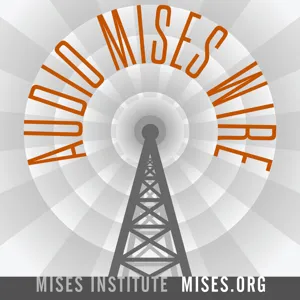Podcast Summary
Interest Rates and Economic Disadvantage: Lower interest rates create new money that enters the economy unevenly, leading to price increases and economic disadvantage for those without early access
In our current economy, those closest to the source of new money creation and dissemination, often achieved through political maneuvering, benefit disproportionately when the Federal Reserve lowers interest rates. This is because lower interest rates effectively create new money, which enters the economy unevenly and leads to price increases. While wages may eventually rise, they lag behind price increases, leaving those without early access economically disadvantaged. The process of money creation and its uneven distribution results in financial distortion, with economic bureaucrats, including those at the Federal Reserve, aware that there is a direct relationship between interest rates and the value of capital assets. In essence, the crony class thrives on artificially low interest rates, while the average person faces relative wealth decline.
Interest rates and asset values: Decrease in interest rates can significantly increase the value of income-producing assets, leading to parabolic price increases and potential market bubbles, while expectations of lower rates can also boost asset prices
Interest rates play a significant role in determining the value of income-producing assets, such as stocks or bonds. This relationship is demonstrated through the dividend discount model, which calculates the present value of an asset based on its expected future cash flows, discounted by the prevailing interest rate. A decrease in interest rates can lead to a substantial increase in the asset's value, even if the underlying business fundamentals remain unchanged. This dynamic can result in parabolic asset price increases, as seen during past market bubbles. It's important to note that expectations of lower interest rates can also lead to asset price increases, even if rates don't change. This dynamic benefits Wall Street and other financial intermediaries, who earn fees from the increased transaction volume. However, the use of artificially low interest rates by central banks, such as the Federal Reserve, can have unintended consequences and risks, including asset bubbles and inflation.
Interest Rates & Market Efficiency: Artificially low interest rates distort market efficiency by making previously unprofitable areas marginally profitable, leading to malinvestment, asset bubbles, excess financialization, and the survival of 'zombie companies'. These phenomena harm the economy, but disproportionately affect those without political access or savings.
In a free market, the challenge for businesses is efficiently allocating capital into productive areas that yield returns greater than the cost of capital. Artificially low interest rates, however, distort this process by making previously unprofitable areas marginally profitable, leading to malinvestment, asset bubbles, excess financialization, and the survival of "zombie companies." These phenomena are harmful to the economy as a whole, but particularly detrimental to those without political access or savings. The Federal Reserve's continued pursuit of low interest rates not only subsidizes incompetence but also breaks the social contract for savers. It is essential for individuals to understand the consequences of these policies and advocate for a return to market-driven interest rates.
Economic Shift: The values of thrift, hard work, and personal responsibility are no longer enough to secure a decent life, and artificially lowering interest rates transfers wealth from the average citizen to the crony class
The values of thrift, hard work, and personal responsibility, once sufficient for securing a decent life for individuals and their families, are no longer enough in today's economic climate. The artificially lowering of interest rates by creating money out of thin air may redistribute wealth, but it cannot produce it. Instead, this process directly transfers wealth from the average citizen to the crony class. It's important to understand that this economic phenomenon is a significant shift from the past, and for more insightful content on this topic, visit Mises.org.
